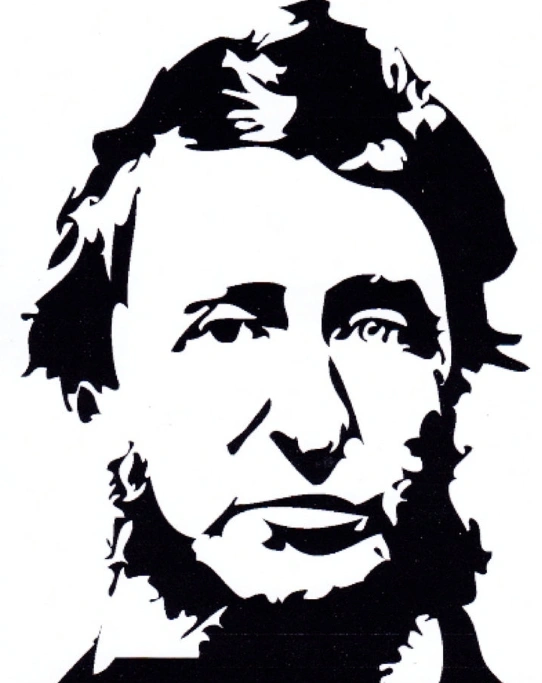Henry David Thoreau.
Publié le 10/05/2013
Extrait du document

Henry David Thoreau. Henry David Thoreau (1817-1862), American writer, philosopher, and naturalist who believed in the importance of individualism. Thoreau's best-known work is Walden; or, Life in the Woods (1854), which embodies his philosophy and reflects his independent character. The book records Thoreau's experiences in a hand-built cabin, where he spent two years in partial seclusion, at Walden Pond near Concord, Massachusetts. Born in Concord, Thoreau was educated at Harvard University. In the late 1830s and early 1840s he taught school and tutored in Concord and on Staten Island, New York. From 1841 to 1843 Thoreau lived in the home of American essayist and philosopher Ralph Waldo Emerson. Emerson was one of the leaders of the school of transcendentalism. Transcendentalists believed that God is inherent in nature and in human beings and that each individual has to rely on his or her own conscience and intuition for spiritual truths. Consequently, the transcendentalists encouraged a free attitude toward authority and tradition, and they helped release American thought and writing from European conventions. While living at Emerson's house, Thoreau met other American transcendentalists, such as educator and philosopher Bronson Alcott, social reformer Margaret Fuller, and literary critic George Ripley. In 1845 Thoreau moved to a crude hut on the shores of Walden Pond, a small body of water on the outskirts of Concord. He lived there until 1847, keeping detailed records of his daily activities, observations of nature, and spiritual meditations. From his experiences he produced his famous work Walden. In Walden, Thoreau writes of the pleasures of withdrawing for a time from mainstream society. While at the cabin, he occupied himself with basic needs and sought to be free of the hurry and anxiety of those who were, in his words, "employed, as it says in an old book, laying up treasures which moth and rust will corrupt and thieves break through and steal." In the woods he read, hoed beans, fished, watched animals, entertained occasional visitors, and enjoyed the weather. The descriptive nature of Walden lets the reader see, hear, and feel Thoreau's experience, and thus understand the value he placed on it. Thoreau left Walden Pond and resided again with Emerson from 1847 to 1848. He then spent the years from 1849 with his parents and sister in Concord. He supported himself by doing odd jobs, such as gardening, carpentry, and land surveying. The major portion of his time was devoted to the study of nature, to meditating on philosophical problems, to reading Greek, Latin, French, and English literature, and to long conversations with his neighbors. Of the numerous volumes that make up the collected works of Thoreau, only two were published during his lifetime: Walden and A Week on the Concord and Merrimack Rivers (1849). A Week on the Concord and Merrimack Rivers is the narrative of a boating trip that Thoreau took with his brother in August 1839; it is a combination of nature study and metaphysical speculation and bears the distinctive impress of the author's engaging personality. The material for most of Thoreau's volumes was edited posthumously by the author's friends from his journals, manuscripts, and letters. In 1846 Thoreau chose to go to jail rather than to support the Mexican War (1846-1848) by paying his poll tax. He clarified his position in perhaps his most famous essay, "Civil Disobedience" (1849), now widely referred to by its original title, "Resistance to Civil Government." In this essay Thoreau discussed passive resistance, a method of protest that later was adopted by Indian leader Mohandas Gandhi as a tactic against the British, and by civil rights activists fighting racial segregation in the United States. The edited collections of Thoreau's writings include Excursions (1863), which contains the well-known essay "Walking"; The Maine Woods (1864); Cape Cod (1865); and A Yankee in Canada (1866). In 1993 Faith in a Seed appeared; this previously unpublished collection of Thoreau's natural-history writings features the essay "The Dispersion of Seeds." Wild Fruits, another previously unpublished work by Thoreau, appeared in 1999. Microsoft ® Encarta ® 2009. © 1993-2008 Microsoft Corporation. All rights reserved.
Liens utiles
- EXCURSIONS [Excursions]. Henry David Thoreau (1817-1862) (résumé)
- SEMAINE SUR LES FLEUVES CONCORD ET MERRIMAC (Une) Henry-David Thoreau
- PREMIERS JOURS DE PRINTEMPS AU MASSACHUSETTS (Les) d'Henry David Thoreau (résumé et analyse de l’oeuvre)
- Thoreau Henry David , 1817-1862, né à Concord (Massachusetts), écrivain américain.
- Henry David Thoreau - Biography.































